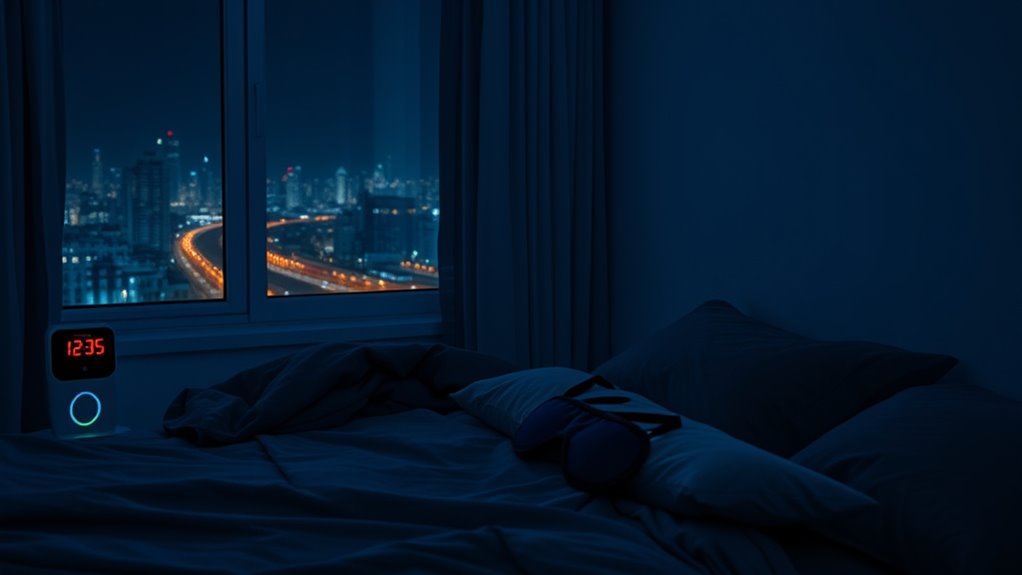To improve sleep hygiene as a shift worker, keep a consistent schedule, even on days off, and create a restful environment by darkening your room, limiting noise, and keeping it cool. Use bright light exposure during your wake hours and dim lights before sleep. Limit caffeine, alcohol, and heavy meals close to bedtime, incorporate relaxation techniques, and plan short naps during shifts. Supporting your needs and managing your environment can make a big difference—explore more tips to optimize your sleep.
Key Takeaways
- Maintain a consistent sleep schedule, even on days off, and create a dark, cool, and quiet sleep environment.
- Maximize daytime light exposure and minimize evening light to regulate your internal clock.
- Limit caffeine, heavy meals, and alcohol before sleep, and practice relaxing routines to promote restful sleep.
- Communicate your sleep needs with employers and seek support from colleagues or support groups.
- Incorporate regular physical activity and use strategic light exposure to boost alertness during shifts.
Establish a Consistent Sleep Schedule
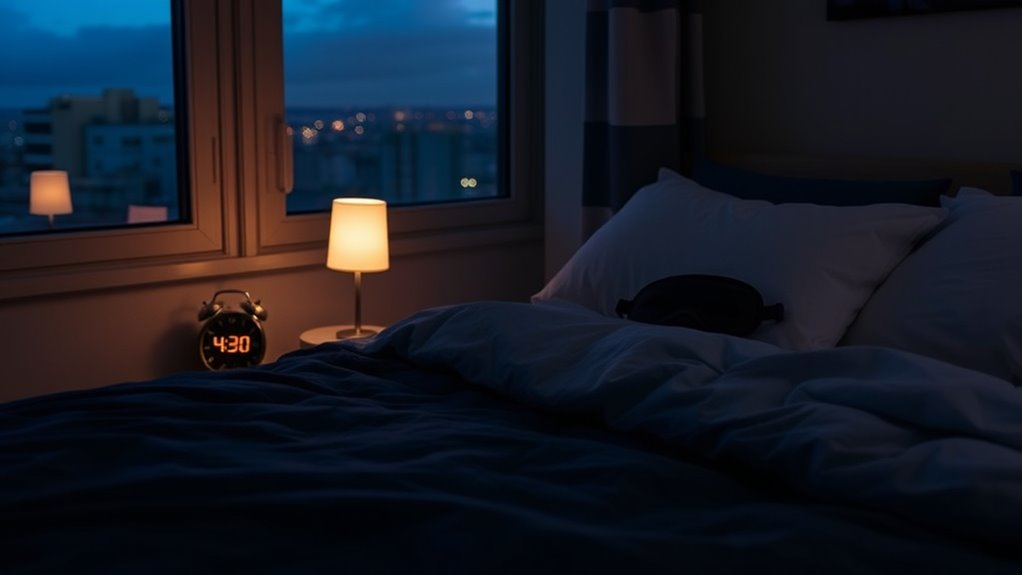
To improve your sleep quality as a shift worker, establishing a consistent sleep schedule is essential. You should aim to go to bed and wake up at the same times every day, even on your days off. This consistency helps regulate your internal clock, making it easier to fall asleep and wake up feeling refreshed. While your work hours might vary, try to prioritize a regular sleep routine whenever possible. Avoid drastic changes in your sleep times, which can disrupt your circadian rhythm. If you need to adjust your schedule, do so gradually—shifting your bedtime by 15-30 minutes each day. Maintaining a steady routine signals your body when it’s time to rest, ultimately improving sleep quality and boosting your overall well-being.
Create a Restful Sleep Environment
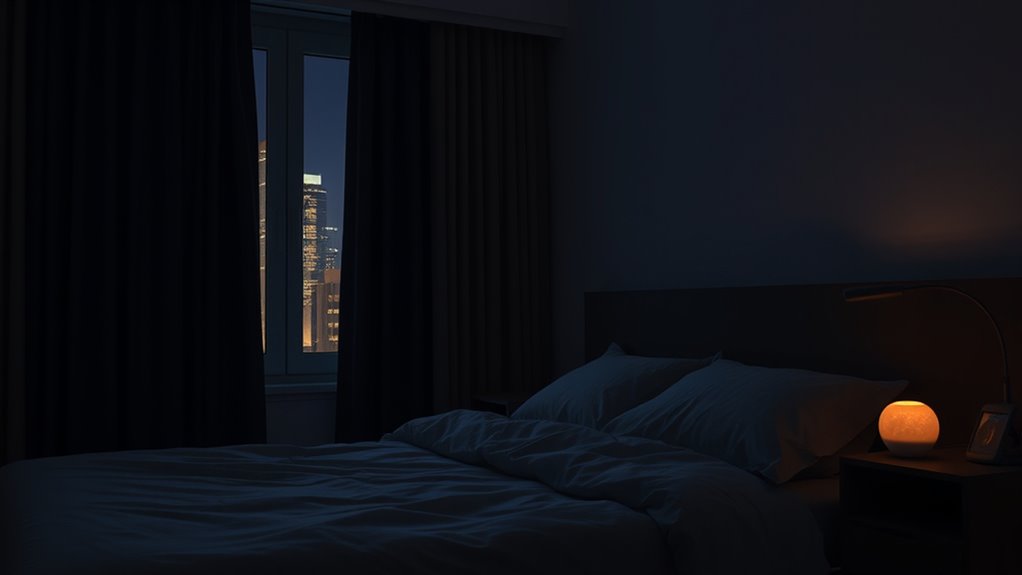
Creating a sleep-friendly environment is essential for shift workers aiming to improve rest quality. Start by making your bedroom dark and quiet. Use blackout curtains or an eye mask to block out light, and consider earplugs or a white noise machine to minimize noise disruptions. Keep your room cool, ideally around 65°F (18°C), to promote better sleep. Remove electronic devices, like phones and tablets, as they emit blue light that can interfere with melatonin production. Invest in a comfortable mattress and pillows that support restful sleep. Keep your sleeping space tidy and free of clutter to create a calming atmosphere. Be aware of decoding slang and informal language that might affect communication about health tips. By optimizing your environment, you set the stage for deep, restorative sleep, helping you feel more refreshed and alert during your shifts.
Use Light to Regulate Your Internal Clock
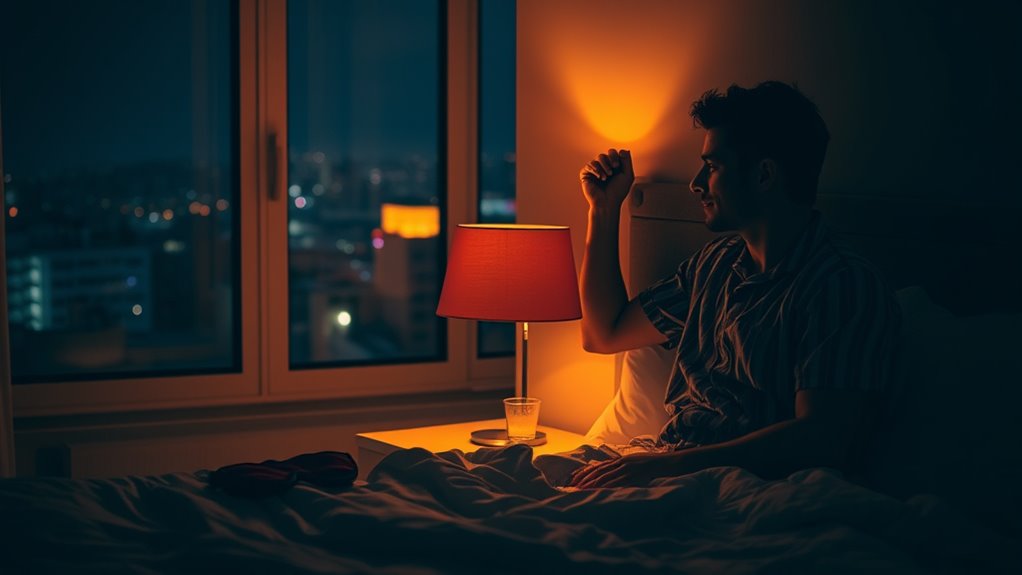
You can help regulate your internal clock by getting plenty of daylight during your wake hours. At the same time, try to limit exposure to bright lights before you sleep, so your body knows it’s time to rest. Using bright light strategically can make a big difference in adjusting your sleep schedule effectively. Embracing attention during your light exposure helps maximize the benefits for your circadian rhythm.
Maximize Daylight Exposure
Maximizing your daylight exposure is essential for regulating your internal clock, especially when working irregular hours. Getting outside during the day helps reset your circadian rhythm, making it easier to stay alert during your shift and sleep well afterward. Aim for at least 30 minutes of natural light each morning or when you’re awake. If sunlight is limited, consider using a light therapy box to simulate natural light, which can boost your mood and reinforce your sleep-wake cycle. Avoid wearing sunglasses during these exposure periods, as they can block beneficial light. Consistency is key—try to spend time outdoors daily to help your body adapt to your schedule. This approach supports better alertness, mood, and overall sleep quality, even with an unconventional work routine. Be mindful of signs of spoilage in food and beverages to ensure safety and freshness in your diet.
Minimize Evening Light
Since evening light can disrupt your circadian rhythm, it’s important to minimize exposure as you prepare to sleep. Bright screens, lamps, and overhead lights send signals to your brain that it’s still daytime, delaying melatonin production. To help your internal clock adjust, dim your lights at least an hour before bedtime. Use low-wattage bulbs or lamps with warm-colored bulbs to create a calming environment. Consider wearing blue-light blocking glasses if you need to use devices. Avoid scrolling on your phone or watching screens late into the night. Creating a dark, quiet space signals to your body that it’s time to wind down. Reducing evening light exposure supports better sleep quality and helps reset your internal clock for more consistent rest. Additionally, incorporating sound therapy into your bedtime routine can promote relaxation and improve sleep onset.
Use Bright Light Strategically
Strategically timed bright light exposure can help reset your internal clock and improve sleep quality for shift workers. Light influences your circadian rhythm, so using it wisely can make a difference. If you work nights, expose yourself to bright light during your shift to stay alert. When heading home, wear sunglasses to reduce light exposure and prepare for sleep. Conversely, if you’re trying to stay awake during a night shift, use bright light to boost alertness. To adjust your schedule gradually, shift your light exposure in small steps. Here’s a quick guide:
| Goal | When to Use Light | Light Type |
|---|---|---|
| Stay awake during shift | Bright light at work | Fluorescent or LED |
| Prepare for sleep | Minimize light exposure before bed | Dim, red light |
| Reset circadian rhythm | Use bright light in the morning | Natural or bright indoor light |
Additionally, incorporating protective styling benefits through techniques like crochet styles for locs can help minimize hair manipulation and breakage during irregular sleep schedules.
Limit Caffeine and Stimulants Before Bedtime
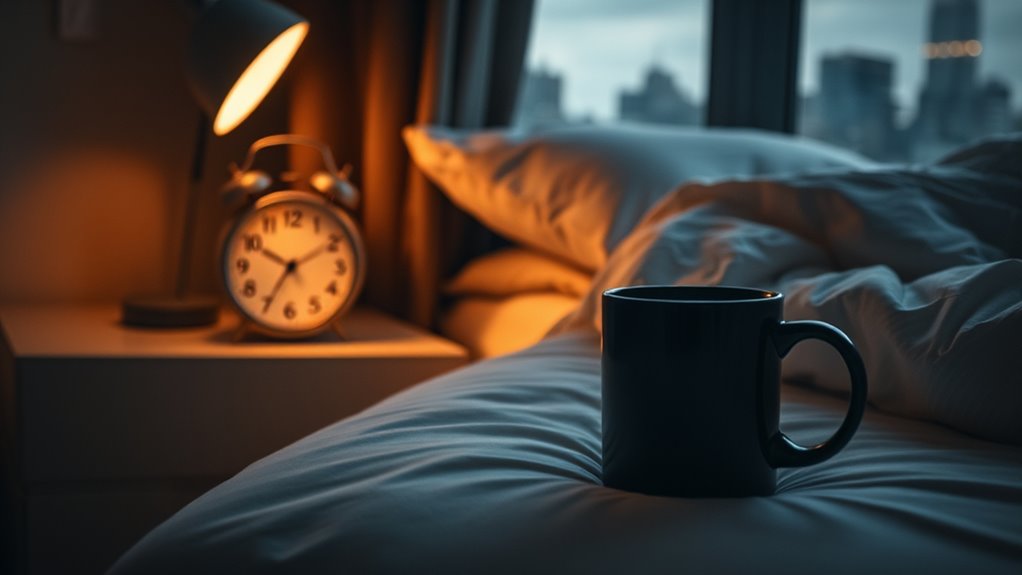
Caffeine and other stimulants can greatly disrupt your sleep if consumed too close to bedtime. When you ingest these substances, they block your sleep-inducing chemicals and increase alertness, making it harder to fall asleep. To improve your sleep quality, consider these tips:
- Avoid caffeine at least 4-6 hours before you plan to sleep.
- Limit other stimulants like energy drinks and certain medications in the evening.
- Switch to water or herbal teas in the hours leading up to bedtime to stay hydrated without disrupting sleep.
Develop Relaxation Routines to Wind Down
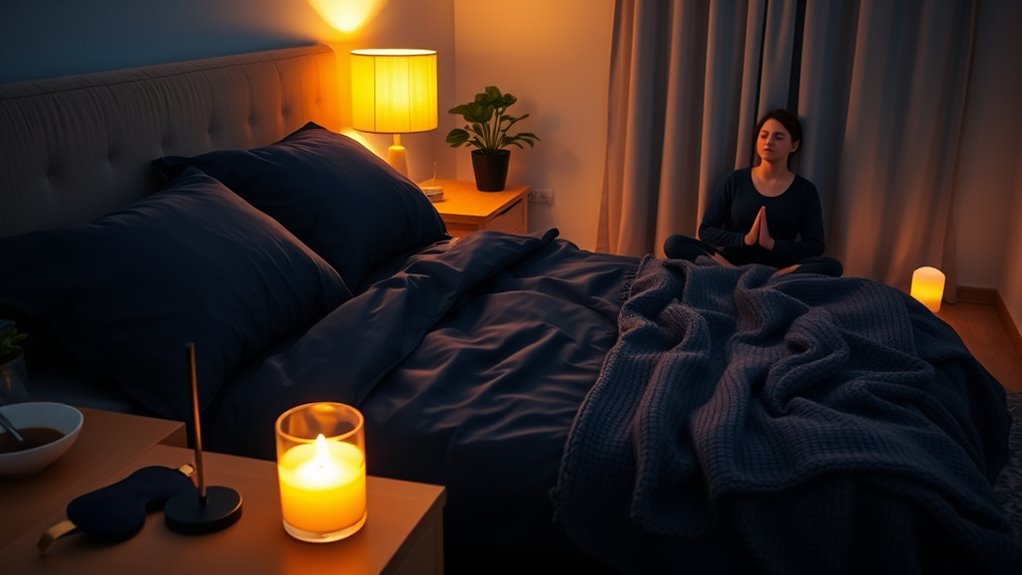
Creating a relaxing routine before bedtime can notably improve your ability to fall asleep and stay asleep. To wind down effectively, try activities that calm your mind and body, such as reading a book, listening to soothing music, or practicing deep breathing exercises. Avoid screens at least 30 minutes before bed, as blue light can interfere with melatonin production. Incorporate calming scents like lavender or chamomile to create a peaceful environment. Establishing a consistent routine helps signal your body that it’s time to relax, even after a long shift. Keep your routine simple and enjoyable, making it easier to shift from work mode to sleep mode. Consistent routines and relaxation techniques can further enhance your sleep quality, helping you feel more rested and alert during your shifts.
Manage Naps Effectively During Work Hours

Since shift work can disrupt your natural sleep patterns, managing naps effectively becomes essential for maintaining alertness and performance. To do this, keep these tips in mind:
- Keep naps short—around 20-30 minutes—to avoid grogginess and help you feel refreshed.
- Schedule naps strategically—preferably during your natural energy dips, like early morning or late night.
- Create a restful environment—use blackout curtains and earplugs to block noise and light, ensuring quality rest.
- Be aware of infidelity exposure risks—maintaining good sleep hygiene can help reduce stress and emotional strain that may lead to unhealthy distractions.
Incorporate Physical Activity Into Your Day
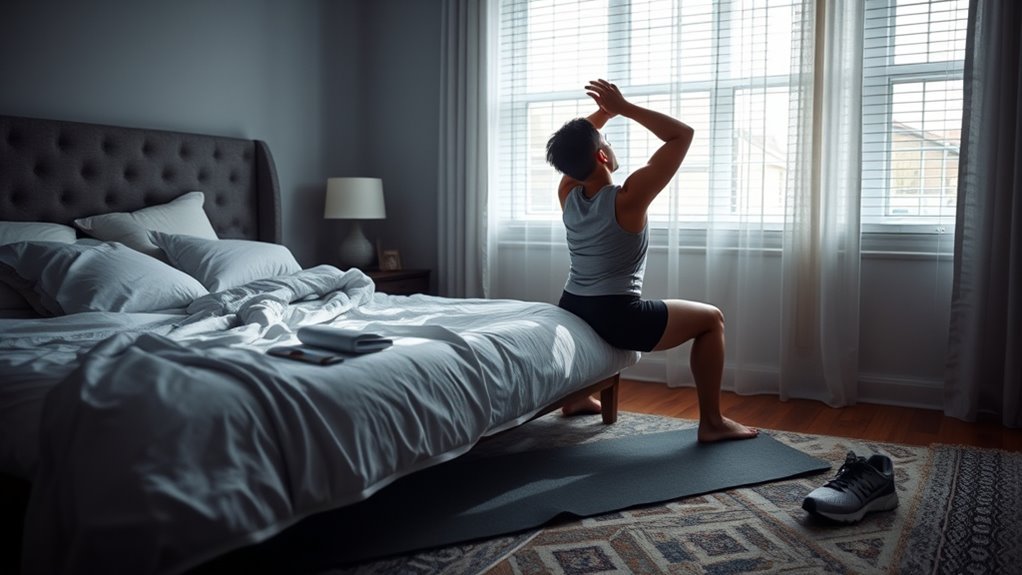
Incorporating physical activity into your day can boost your energy levels and improve your overall alertness, especially when working irregular hours. Even a short walk or quick workout can help reduce fatigue and increase blood flow, making you more alert during shifts. Aim to include movement during breaks or before your shift begins. Exercise also helps regulate your circadian rhythm, supporting better sleep when you’re off duty. You don’t need intense workouts; simple activities like stretching, stretching, or light cardio can make a difference. Consistency is key, so try to make physical activity a regular part of your routine. Remember, staying active not only enhances your energy but also reduces stress, helping you stay focused and alert during your unpredictable work hours. Incorporating mindset strategies from the Law of Attraction can further enhance your motivation and commitment to maintaining an active lifestyle.
Avoid Heavy Meals and Alcohol Before Sleeping

Consuming heavy meals or alcohol before bed can disrupt your sleep quality and make it harder to rest deeply. When you eat large or greasy meals, your body works harder to digest, keeping you awake or restless. Alcohol might initially make you feel sleepy, but it interferes with your sleep cycles, leading to fragmented rest. To improve your sleep, consider these tips: 1. Avoid large, greasy, or spicy meals 2-3 hours before bedtime. 2. Limit alcohol intake, especially close to your sleep time. 3. Opt for light, easily digestible snacks if you’re hungry before sleeping. Being aware of toilet flushing mechanisms can also help in managing water use and preventing plumbing issues, especially in shared or public spaces.
Seek Support and Communicate Your Needs

Talking openly about your sleep struggles can lead to understanding and support from those around you. Don’t hesitate to ask for flexible scheduling or adjustments that help you rest better. Building a support network makes managing your shift work and sleep easier. Additionally, sharing your experiences with others familiar with your situation can provide valuable tips and reassurance. Gelato flavors and other enjoyable treats can also serve as small rewards for prioritizing your rest and self-care.
Share Your Sleep Challenges
Sharing your sleep challenges can be a crucial step in managing shift work sleep issues. When you openly talk about your struggles, you create opportunities for support and understanding. Here are three ways sharing helps:
- Gaining advice from others who face similar challenges.
- Receiving emotional support to reduce feelings of isolation.
- Finding practical solutions tailored to your unique schedule.
Request Flexible Scheduling
If you’re struggling to get adequate rest due to your shift schedule, requesting flexible work hours can make a significant difference. Talk to your employer about shifting your hours to better suit your sleep needs, such as starting later or ending earlier. Explain how adjusting your schedule can improve your overall health, alertness, and productivity. Be clear about your specific needs and offer solutions that benefit both you and your workplace. Many employers are willing to accommodate flexible schedules for shift workers when it promotes safety and well-being. Remember, open communication is key. By proactively discussing your sleep challenges, you increase the chances of finding a schedule that allows you to rest better while fulfilling your job responsibilities.
Build Support Network
Building a support network is essential for managing the challenges of shift work, as having people you can rely on makes it easier to prioritize your sleep and well-being. When you communicate your needs clearly, you create understanding and reduce stress. To strengthen your network:
- Talk openly with family and friends about your schedule and sleep requirements.
- Seek coworkers who understand shift work challenges and can offer advice or flexibility.
- Join online or local support groups for shift workers to share experiences and tips.
Having these connections helps you stay motivated and accountable. They can provide emotional support during tough times and remind you to stick to your sleep routines. Building this network boosts your resilience and makes managing irregular hours more sustainable.
Frequently Asked Questions
How Can Shift Workers Prevent Chronic Sleep Deprivation Effectively?
To prevent chronic sleep deprivation, you need to prioritize consistent sleep schedules, even on days off. Create a dark, quiet, and cool sleeping environment to improve rest quality. Avoid caffeine and heavy meals before bed, and limit screen time afterward. Incorporate short naps when possible, and establish relaxing bedtime routines. Staying disciplined about your sleep habits helps your body adjust and reduces the risk of ongoing sleep issues.
What Are the Best Strategies for Adjusting to Rotating Shifts?
Many believe that adjusting to rotating shifts is impossible, but you can succeed with the right approach. Start by maintaining consistent sleep times, even on days off, to regulate your internal clock. Use blackout curtains and earplugs to create a dark, quiet sleep environment. Prioritize healthy meals and exercise to boost your energy. Gradually shift your sleep schedule before rotations, and stay hydrated to help your body adapt more smoothly.
How Does Sleep Hygiene Impact Overall Health for Night Workers?
Improving your sleep hygiene directly boosts your overall health, especially as a night worker. When you prioritize consistent sleep routines, create a restful environment, and avoid stimulants before bed, you support your immune system, mental clarity, and heart health. Good sleep habits help reduce stress and fatigue, making you more alert and resilient. By taking care of your sleep hygiene, you empower your body to function most effectively, even during irregular hours.
Can Technology Assist in Improving Sleep Quality for Shift Workers?
Technology can definitely help improve your sleep quality. You might use apps to track your sleep patterns, set reminders to stick to a consistent schedule, or wear devices that monitor your rest. Additionally, blackout curtains or smart lighting can create a better sleep environment. These tools support you in managing irregular sleep schedules, making it easier to rest well despite shift work demands.
What Are Signs of Sleep Disorders Specific to Shift Workers?
Like a lighthouse guiding ships through fog, recognizing signs of sleep disorders helps you navigate your health. You might feel persistent fatigue, trouble staying alert, or irritability even after rest. You could also experience difficulty falling asleep during the day or frequent awakenings. If these symptoms linger, they may signal a sleep disorder. Addressing them early can improve your overall well-being and guarantee you’re ready to face each shift confidently.
Conclusion
By following these sleep hygiene tips, you can better manage your sleep despite shift work. For example, imagine Sarah, who adjusts her schedule and creates a dark, quiet space for daytime sleep. Over time, she feels more rested and alert during her shifts. Remember, prioritizing your sleep improves your health, safety, and performance. Small changes make a big difference—start implementing these strategies today for a healthier, more balanced life.
